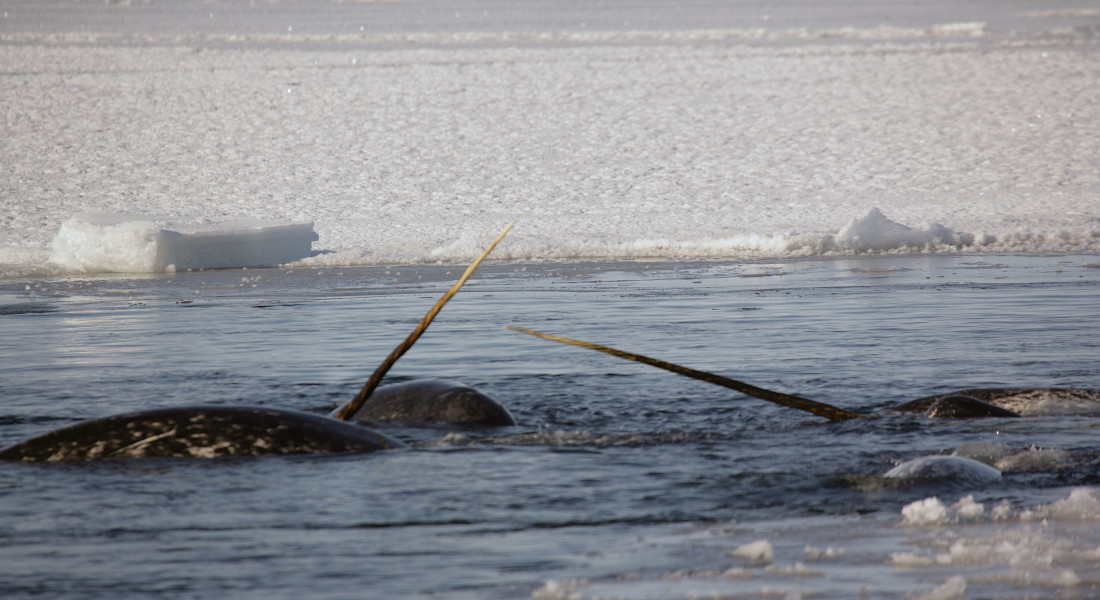Two new DFF grants on arctic research awarded to Globe researchers
Two research projects to explore the adaptations and use of ancient sled dogs in SW Greenland and recent demographic changes in Arctic whales, funded by Independent Research Fund Denmark’s 2024 thematic call for ‘Arctic research – Climate change and sustainable arctic communities’.

As part of the research reserve in 2024, Independent Research Fund Denmark (DFF) has allocated DKK 40.6 million for the thematic research call Arctic research - Climate change and sustainable arctic communities, to strengthen research that can contribute to sustainable development in the Arctic through a greater understanding of climate change and its significance for biodiversity, ecosystems, cultural heritage, and living conditions in the Arctic.
The two projects awarded to Globe – on Inuit dogs and on Arctic whales – have each been designed and will be carried out in close collaboration with partnering institutions in Greenland. Both projects also include a strong dissemination component.
"There is strong competition, and we have received many good applications. Therefore, it is also the best of the best who receive a grant and who must contribute to advancing science in the field of climate change and sustainable development in the Arctic societies," says Thomas Ingeman-Nielsen, chairman of the expert committee established by the DFF Board of Directors for the thematic call.
Research project 1: Ancient Thule Inuit dog populations in Southwest Greenland: proxy for future Inuit dog survival in the Arctic
Amount funded: DKK 3,161,120
Principal Investigator: Professor Anders J Hansen
In collaboration with Christian Koch Madsen at Nunatta Katersugaasivia Allagaateqarfialu (Greenland National Museum and Archives) and Morten Meldgaard at SILA, Ilisimatusarfik (University of Greenland)
The dog has been central to the Thule Inuit culture for more than 2000 years and the Inuit brought the dogs all the way from Siberia to Greenland. Today, the dogs are widely distributed in Greenland except in the southwest.
Over the last decades the sled dog population has decreased rapidly due to increasing use of snowmobiles and the receding sea ice due to climate change. The incremental reduction in sea ice has shortened the dog sled seasons, which is why the number of dogs is under rapid decline. From 1200 to 1700 BC the sled dogs in the southwest of Greenland have been exposed to similar climatic conditions with low sea ice cover warranting alternative uses. It was during the time of co-occupation with the Norse and later European whalers.
The aim of this study is to gain information about the adaptations and use of the ancient sled dog population of southwest Greenland. Furthermore, to use this knowledge as a proxy for mitigating actions to secure a sustainable dog population in the future.
Read more about the research project
Research project 2: BRIDGE - Bridging fundamental science and applied conservation in polar research
Amount funded: DKK 6,151,958
Principal Investigator: Professor Eline Lorenzen
In collaboration with Mads Peter Heide-Jørgensen at Pinngortitaleriffik (Greenland Institute of Natural Resources)
The three Arctic whale species (bowhead, narwhal, beluga) are sentinel species for addressing the impact of climatic and anthropogenic perturbations on Arctic marine ecosystems. With the ongoing reduction of sea ice and increasing sea temperatures, Arctic marine ecosystems have reached a tipping point.
In collaboration with Greenland Institute of Natural Resources, this project will use state-of-the-art genomic approaches and generate genome-wide data from a unique time series of thousands of whale tissue samples collected since the year 2000. We aim to evidence fine-scale demographic changes in each species over the past two decades in response to environmental stressors.
The study will elucidate fundamental questions of how population change in top predators impact key demographic parameters including relatedness, social structure and connectivity, and in the process set the baseline for future science-based biodiversity monitoring of marine species in the Arctic.
Contact:
Professor Anders J Hansen: ajhansen@sund.ku.dk
Professor Eline Lorenzen: elinelorenzen@sund.ku.dk
